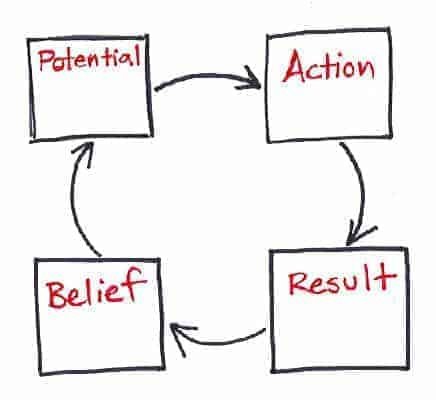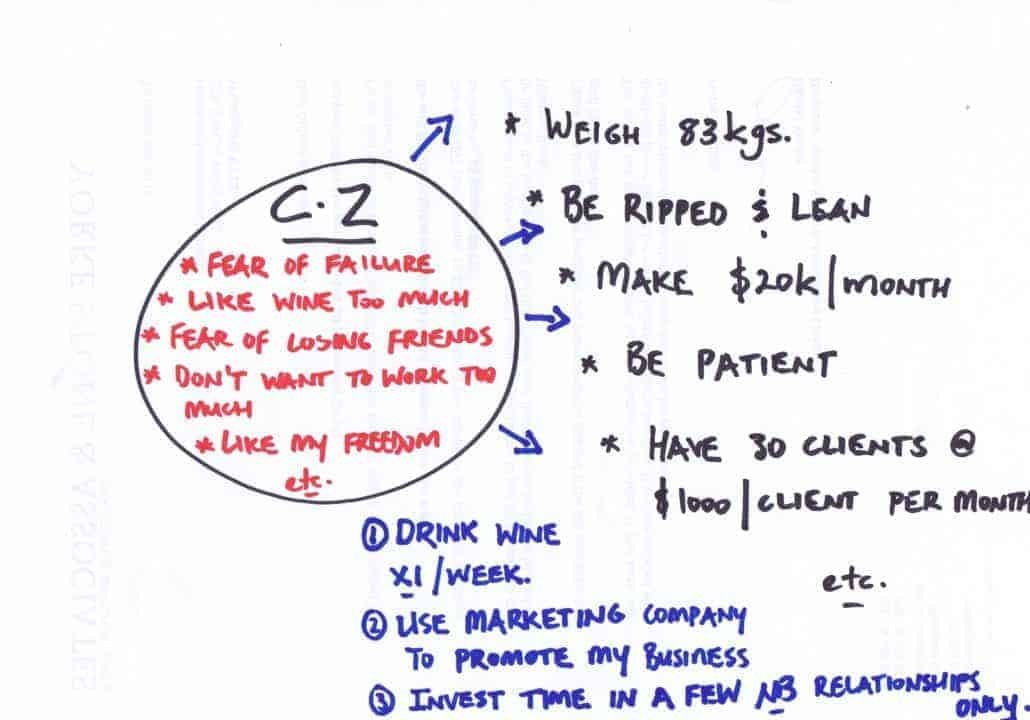In this post we’ll look at 4 common self-sabotaging examples to avoid and what to do about them.
We can be our own biggest enemies and downfall at times.
We may have lofty ambitions and ideals, but we often find ourselves impeding our own growth when it counts the most.
Have you ever found yourself repeating self-defeating behaviours?
I’m sure I have.
And if you have, are you willing to let go of your restricting behaviours in exchange for a more positive approach and greater success?
The first step to the success you crave is being able to recognise the limiting beliefs that stand in the way of your success.
Once you do, you can banish those beliefs in favour of more empowering ones.
Tony Robbins talks about the success cycle.
Here’s what it looks like:

What the cycle points out is the impact “belief” has on any “result” in your life.
You can have all the potential in the world, but the amount of action you will take that will produce a great result, is determined by the amount of belief you have in your potential (or yourself).
If you have little to no belief or unhelpful beliefs, you will only tap into a portion of your potential and consequently take very small actions that will result in a very small outcome.
But this is not where this cycle stops.
Robbins explains that the result we end up with (the one that we created) becomes the proof or validation of our existing belief.
For example, if I believe I am a terrible salesperson, it will affect my potential to be a great salesperson as well as the amount of action I do, giving me the outcome of a poor salesperson. I will then use this poor performance as evidence to support my assumption that I am a bad salesperson. As a result, we establish a vicious circle.
We end up believing even less in our potential, which means we take even less action, which results in an even lower outcome, which then feeds back into our belief, and so on.
Therefore the first step to success is recognising any self-limiting beliefs that you might have and attacking them by replacing them with more helpful empowering beliefs.
Now, this doesn’t mean that you make things up because your unconscious mind simply won’t believe it.
That’s why certain affirmations don’t work.
You might tell yourself 1000 times per day that “I am skinny and happy,” but if you know that it’s not true, your mind will reject it.
It is far more beneficial to affirm and reinforce something real that may be turned into a good belief than to hold onto a self-limiting one.
For example, if you’ve recognised your self-limiting thought that you’re a bad salesperson, you could wish to replace that idea by emphasising something else that is real, credible, and more empowering. For example, being good with people.
Maybe you think you’re terrible at selling anything, but you absolutely believe and know you’re great at connecting with people.
This belief can supplement your behaviour as a salesperson in the future, but it can also serve as the foundation for an empowered attitude and belief(s) essential to be successful in sales.
So, before moving on to the rest of this article, make sure that you’ve made a list of the most obvious self-limiting beliefs that you have and that have been holding you back.
Beliefs that might have caused you to self-sabotage in the past.
Once you have that list, you can replace them with more productive thoughts that support your success.
Let’s now look at 4 common self-sabotaging examples to avoid:
Settling for less than your best
When you settle for less than your best, it causes you to stop short of unleashing your fullest potential.
Sometimes you settle for less because you’re scared of encountering failure.
Other times, you may settle simply because you lack awareness of your own strength.
But you have to start testing your strength constantly by going out of your comfort zone.
Face your fears, because more often than not, your fear is the only obstacle between you and ultimate success.
What I’ve learned after working with many different people as well as from our own life, is that we typically know where our comfort zone is.
We know what it is that we need to do or attempt at least, in order to get to that next level of success.
Maybe it’s waking up earlier and going to the gym.
Maybe it’s drinking less wine in the evening.
Perhaps it’s resisting the second helping during mealtime.
Perhaps it’s avoiding certain people.
Maybe it’s putting yourself out there more boldly and courageously.
Whatever it is for you, we typically know what it is.
The challenge is moving from knowing about it to doing something about it.
So, take a piece of paper and draw a big circle on it.
Name it your “comfort zone.”
Outside of the circle write down all the things you would like to achieve but have failed to so far.
Inside the circle, write down all the reasons or excuses that have kept you inside that circle.
Next, create at least one plan to challenge these justifications or excuses, to push you outside of your comfort zone and closer to any of the outcomes outside of the circle.

If one strategy doesn’t work, come back to this piece of paper and come up with another strategy that you can attempt.
The secret is, keep moving forward.
If one approach doesn’t work, you change your approach.
If that doesn’t work, you change it again.
And you keep changing your approach until you get the result you want.
That is the essence of discipline and focus.
Do not get pulled in by the notion that anything good must be accomplished quickly and simply; this is not how the world works.
Somebody that I view as my mentor, Brendon Burchard, has a saying:
Honour the struggle.
To really unleash your best, you have to be willing to spend time mastering yourself and your abilities.
Few worthwhile things in life come easily, because if they did, everyone would have them and they won’t be that worthwhile.
Expecting too much from others
When you automatically expect help from others or anticipate that others will bail you out of a tough situation, you’re expecting too much.
You are only responsible for yourself.
Even if your friends and family have helped you in the past, they won’t always be around to help you out.
It is great having people we can call on at any time, but you have to always be prepared to suffer the consequences of your actions and clean up your own mess.
Choose a more sensible route that takes into account the possibility of you travelling alone to your destination.
Most of my clients know I have to say that, you are the director of your company, You Ltd.
Not only that, but you also work at the front desk, as a salesperson, in the marketing department, in human resources, and as a cleaning. It is entirely up to me whether or not this occurs. You are both the start and the finish line of your own trip. You are accountable for your decisions, actions, and outcomes.
When you expect support from people long before you actually need it, you are setting yourself up for sabotage.
Because you know there is a scapegoat in the back of your mind.
You’ve got a safety net.
As a result, you pursue certain ambitions with the unconscious notion that you will be bailed out if things go wrong.
With this in mind (unconsciously) we have no fear of failure, and succeeding becomes an option, not a must.
I believe being scared to fail is a good thing, not to the point where it paralyses us, but definitely as energy to spur us on to give our best.
Relying on others too much is a sure way to sabotage your progress in the long run.
That doesn’t mean you can’t rely on others or ask for help when you need it, but it does mean you have the option of seeking aid when you really need it.
But even then, you trust in your ability to figure it out and get it done.
You feel sorry for yourself
Feeling sorry for yourself is a sure way to set yourself up for self-sabotage.
With a defeatist mindset or victim mentality, you can forget about any progress in your life or business.
No matter how sorry you feel for yourself, or how much you blame others for your misfortune while they enjoy the pleasures of life, success will always elude you as long as you maintain this perspective.
If your current situation causes you to feel like something’s missing, change your circumstances.
The great teacher, Jim Rohn, used to say, “if you’re unhappy with where you are, you’re not a tree, so get up and move.”
Therefore, instead of dwelling on what could have been and focusing on the unfortunate hand you’ve been dealt, seek to learn from every experience and focus on solutions, instead of problems.
Figure out a way to improve your situation rather than begrudge it.
As I said before, your success is your responsibility.
Hold yourself accountable for your results and allow unfortunate situations to steer you toward success, instead of deterring you from achieving your dreams.
By maintaining this mindset, even your worst trial will be far better than remaining on the sidelines of life.
Society is filled with people blaming, complaining and finding excuses for why they not living fulfilling lives. Don’t let that be you. Choose to be different.
Avoid setting yourself up for failure through sabotage, because you’re harbouring a mindset of a victim.
Stop feeling sorry for yourself, and start getting excited about all the possibilities this world has to offer.
And, in this information age, where you have access to all you need to know to enhance your life, focus your time and energy on that rather than waste it on social media. It’s pointless and will never make you more successful.
Lack of a second plan
Another common self-sabotaging example to avoid is lacking a second plan to your first one.
It’s kind of like having one goal without any progressive goals.
If your initial plan gives less than desired results, your only chance at success is your ability to adapt.
Everyone needs a Plan B.
You may feel like a pessimist by planning for an unfortunate outcome, but this planning is actually proactive.
It shows your mind that you’re serious about reaching your desired destination.
Ensure your financial security, mental health, and well-being by always planning for the worst while hoping for the best.
The same goes for your goals.
Rather than having one isolated goal, or a few isolated goals, start thinking in terms of progressive goals.
This means that you have goals that build on one another. So when you get to one, you start heading towards the next one. And each objective propels you to new heights of success or achievement.
In this way, you never run the risk of reaching a point where you’ve reached your goal but it failed to be as great as you anticipated initially. You simply use it as a stepping stone for the next.
Final thoughts
If you often find yourself doing any of these self-sabotaging behaviours that hinder your chances of success, decide that today is going to be a new day.
The important thing is that you recognise the thought patterns and behaviours that limit you and head in a new direction that supports your success.
Replace stinking thinking with a productive, solution-oriented focus that tells your mind you deserve the success you seek.
When you do, your success is inevitable.
Please leave your comments and questions below, as I love reading them.




